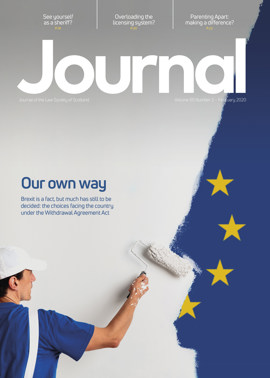Bench marking
A model of best recruitment practice, or an exercise designed by and for civil servants? Such opposing views can be heard on the processes followed by the Judicial Appointments Board for Scotland as it seeks the best people to sit in judgment in our courts.
Good, bad or indifferent, they are the processes that will be faced by applicants in the latest round for sheriff and summary sheriff appointments, due to begin imminently. And whatever your opinion, it is hard to fault the Board’s efforts to encourage as diverse a field as possible to apply.
Nicola Gordon, its non-lawyer chair, previously interviewed at Journal, June 2018, 12, is keen to talk anew of developments ahead of this round. What, then, has changed?
First, she tells me, the Board has tried to “lighten the burden” of applying. Following research into applicants’ experience, a new application system has been introduced; the desired skills and qualities (set out at
www.judicialappointments.scot) have been clarified; and the process reviewed to keep it as short and simple as possible, while ensuring its integrity.
Could it be you?
What has not changed is the Board’s desire that the widest range of people consider applying. “There are a lot of vacancies due to retirements, so it’s really important to us that a large range of eligible people consider what a move to the judiciary could do for them,” Gordon, pictured, emphasises. “Our prospective candidates for sheriff and summary in the next competition could be in-house solicitors, partners or associates in a bigger or smaller firm, as well as the more obvious solicitor advocates or advocates. And if there’s one thing I would like to get across it’s the idea that many people might find these jobs attractive: it’s a demanding role but a satisfying role, and it’s obviously very responsible but a different kind of responsibility compared to being a partner in a solicitors’ firm.”
What sort of experience would the Board expect, say, in-house solicitors to offer? “We don’t ask for judicial experience per se, but we will ask people to provide evidence that they have the qualities that would pertain. For example, they have been a school governor or part of a disciplinary body or something of that nature, but really anything people can come up with that demonstrates the qualities that would be appropriate on the bench. Not necessarily practising litigation. And we have tested ourselves by asking, will our process fairly assess the qualities of someone with different experience, because you can hold back diversity if your process selects a certain kind of person. We’ve looked very hard at that, and think we are being as fair as we possibly can to a very wide range of skills and experience.”
Widening the pool of applicants will inevitably leave many disappointed, but with vacancy numbers in the coming exercise “into double figures” (split between sheriffs and summary sheriffs; applicants will have to choose which to pursue), and similar numbers expected annually for some years to come, a fair number are set to be interviewed. Again applying best practice, the Board sees two to three times the number of vacancies, assuming enough quality applicants.
Hearing the critics
One criticism aired recently (Journal, August 2019, online edition) was the lack of proper feedback to the unsuccessful, but those who make it to interview always receive individual feedback. In addition, “We are looking at an approach now with a view to letting those not shortlisted understand better whether the shortcomings we identified were their legal or personal and judicial qualities, so that they know where to focus, or whether it was simply a strong field. Because sometimes people would have been satisfactory had it not been for a strong field. We will be doing that for all applicants.”
More fundamentally, the whole process, including interview, has been labelled superficial, not disclosing the qualities of the interviewee, and designed for civil servants rather than judges (Journal, September 2019, 6). The Board is not deaf to such comments.
“A number of things,” Gordon responds. “One is we do challenge people with case studies which are very much real life scenarios, at interview. Another is that we take regard to best practice in recruitment, whether it’s judicial appointments on a global basis, or how senior level appointments are being done in other walks of life. What we do is thoughtfully and carefully considered.
“There is some wisdom in every view, of course there is, and we take these criticisms seriously. I look at the qualities of people on the bench and ask, is it the perfect system? I don’t know what a perfect system would be like. Does it identify good people who contribute to justice in Scotland, take difficult decisions day in, day out on the bench? Yes it does.”
Register at www.judicialappointments.scot for alerts about forthcoming vacancies







